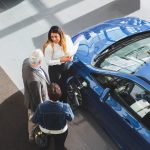Americans skeptical of self-driving car technology.
As more and more cars are developed with self-driving capabilities, the public as a whole are skeptical of this technology. Two-thirds say they feel unsafe as a passenger in a self-driving car (64 percent) and 68 percent are fearful of walking the streets alongside driverless vehicles.
Older Americans are more worried about this technology, more than seven in ten of those 55 and older say they feel unsafe as a passenger or pedestrian, while the youngest adults are less concerned about being a passenger (46 percent) or pedestrian (57 percent).
Still, a third (33 percent) are at least somewhat likely to make their next car a self-driving one when the tech is fully developed. This includes more than four in ten men and millennials, who are the most likely to purchase a self-driving car.
Similar levels of excitement (or lack thereof) for electric vehicles
Although electric cars are already on the road, similar to the share who are interested in a self-driving car, just over a third are likely to buy an electric vehicle (36 percent). Why aren’t people interested? Lack of charging stations available (47 percent of those who aren’t likely to purchase)--though this could be much less of an issue in a few years, cost (41 percent), and a general preference for gas-powered cars (37 percent).
More men have a clear preference for Tesla (38 percent) compared to women (24 percent) with similar shares whose interest is split between other brands (Chevrolet, 26 percent, Nissan, 22 percent).
But for those pro-purchasing an electric car, the top reasons they’re interested include: benefits to the environment (73 percent), gas savings (72 percent), and the convenience of being able to charge it at home (36%). Environmental impact is the number one reason cited for Democrats (82 percent), while Republicans are more interested in purchasing them because of the savings on gas (76 percent). These prospective electric car buyers looking at Tesla, Chevy, and Nissan as their next car also have the patience to wait for their car to “fill up”.
Unlike the 10 minutes or less it takes to fill up a tank of gas, 41 percent would be willing to wait a full hour to charge their car to be able to travel 200 miles. But, while they are willing to wait for a charge, they aren’t willing to compromise on range. Over half of likely electric car buyers (55 percent) want the freedom to take a road trip (300-350 miles) with their car before having to stop to charge.
Read more about our polling methodology here.
Click through all the results in the interactive toplines below:
Do you think automotive safety regulations are strict enough, or could be improved?
Gender Answer Total Male Female Unweighted N 2,586 1,288 1,298 Strict enough 50%58%42%Could be improved 47%40%54%No answer 3%2%4%Question wording: Do you think automotive safety regulations are strict enough, or could be improved?Survey dates: –How much have you heard about self-driving cars?
Gender Answer Total Male Female Unweighted N 2,586 1,288 1,298 A lot 26%34%17%Some 51%49%52%Not much 17%12%23%None at all 5%3%6%No answer 2%1%2%Question wording: How much have you heard about self-driving cars?Survey dates: –How safe would you feel being a passenger in a self-driving car today?
Gender Answer Total Male Female Unweighted N 2,586 1,288 1,298 Extremely safe 3%4%1%Very safe 7%10%4%Somewhat safe 25%29%21%Not so safe 34%32%36%Not at all safe 30%23%36%No answer 2%2%2%Question wording: How safe would you feel being a passenger in a self-driving car today?Survey dates: –How safe would you feel as a pedestrian in an area with self-driving cars today?
Gender Answer Total Male Female Unweighted N 2,586 1,288 1,298 Extremely safe 3%5%2%Very safe 7%10%4%Somewhat safe 20%23%18%Not so safe 33%30%36%Not at all safe 34%30%39%No answer 2%1%2%Question wording: How safe would you feel as a pedestrian in an area with self-driving cars today?Survey dates: –How likely are you to purchase a self-driving car once the technology is fully developed?
Gender Answer Total Male Female Unweighted N 2,586 1,288 1,298 Extremely likely 6%10%3%Very likely 8%11%6%Somewhat likely 19%20%18%Not so likely 24%21%26%Not at all likely 41%36%46%No answer 2%2%2%Question wording: How likely are you to purchase a self-driving car once the technology is fully developed?Survey dates: –Based on what you know about electric cars, ones that use just electric power, how likely is it that your next car lease or purchase will be an electric car?
Gender Answer Total Male Female Unweighted N 2,586 1,288 1,298 Extremely likely 5%7%3%Very likely 9%8%10%Somewhat likely 23%23%23%Not too likely 32%29%34%Not at all likely 30%31%29%No answer 2%2%2%Question wording: Based on what you know about electric cars, ones that use just electric power, how likely is it that your next car lease or purchase will be an electric car?Survey dates: –Which of the following are reasons you would not consider purchasing or leasing an electric car? (Select all that apply.)(AMONG NOT LIKELY TO PURCHASE)
Gender Answer Total Male Female Unweighted N 1,519 757 762 Lack of charging stations 47%48%46%Initial cost 41%44%38%Prefer gas-powered cars 37%42%33%Lack of service centers 28%29%27%Hybrid batteries bad for environment 16%17%14%Other cars get better mileage 9%8%9%Don’t want/need to use a car 5%4%6%Waiting for self driving cars 2%3%2%Other (please specify) 15%19%11%None of the above 9%7%12%No answer 1%0%1%Question wording: Which of the following are reasons you would not consider purchasing or leasing an electric car? (Select all that apply.)(AMONG NOT LIKELY TO PURCHASE)Survey dates: –Which of the follow are reasons you would consider purchasing or leasing an electric car? (Select all that apply.)(AMONG LIKELY TO PURCHASE)
Gender Answer Total Male Female Unweighted N 1,028 511 517 Savings on gas 72%73%71%Better for the environment 73%71%76%Like the look 10%13%8%Convenience of charging at home 36%41%30%Quieter than gas cars 24%26%21%Other (please specify) 4%5%3%None of the above 2%1%3%No answer 1%0%1%Question wording: Which of the follow are reasons you would consider purchasing or leasing an electric car? (Select all that apply.)(AMONG LIKELY TO PURCHASE)Survey dates: –From which brand would you be most likely to purchase an electric car? (AMONG LIKELY TO PURCHASE)
Gender Answer Total Male Female Unweighted N 1,028 511 517 Tesla 31%38%24%Chevrolet 21%17%26%Nissan 19%16%22%BMW 12%11%13%Other (please specify) 14%16%12%No answer 2%2%3%Question wording: From which brand would you be most likely to purchase an electric car? (AMONG LIKELY TO PURCHASE)Survey dates: –If you were going to purchase or lease an electric car, how far would you want to be able to drive the car before needing to charge it? (AMONG LIKELY TO PURCHASE)
Gender Answer Total Male Female Unweighted N 1,028 511 517 100 miles 3%4%3%150 miles 6%5%6%200 miles 19%20%18%250 miles 16%16%16%300 miles 15%18%11%350 miles 40%36%45%No answer 1%0%1%Question wording: If you were going to purchase or lease an electric car, how far would you want to be able to drive the car before needing to charge it? (AMONG LIKELY TO PURCHASE)Survey dates: –And, what is the longest would you be willing to wait for the car to be charged enough to travel about 200 miles? (AMONG LIKELY TO PURCHASE)
Gender Answer Total Male Female Unweighted N 1,028 511 517 1 hour 41%42%40%45 minutes 12%11%14%30 minutes 31%33%28%15 minutes 11%9%13%5 minutes 4%4%4%No answer 1%1%1%Question wording: And, what is the longest would you be willing to wait for the car to be charged enough to travel about 200 miles? (AMONG LIKELY TO PURCHASE)Survey dates: –
Sample question text:
Do you think automotive safety regulations are strict enough, or could be improved?
How much have you heard about self-driving cars?
How safe would you feel being a passenger in a self-driving car today?
How safe would you feel as a pedestrian in an area with self-driving cars today?
How likely are you to purchase a self-driving car once the technology is fully developed?
Based on what you know about electric cars, ones that use just electric power, how likely is it that your next car lease or purchase will be an electric car?
*consumers



